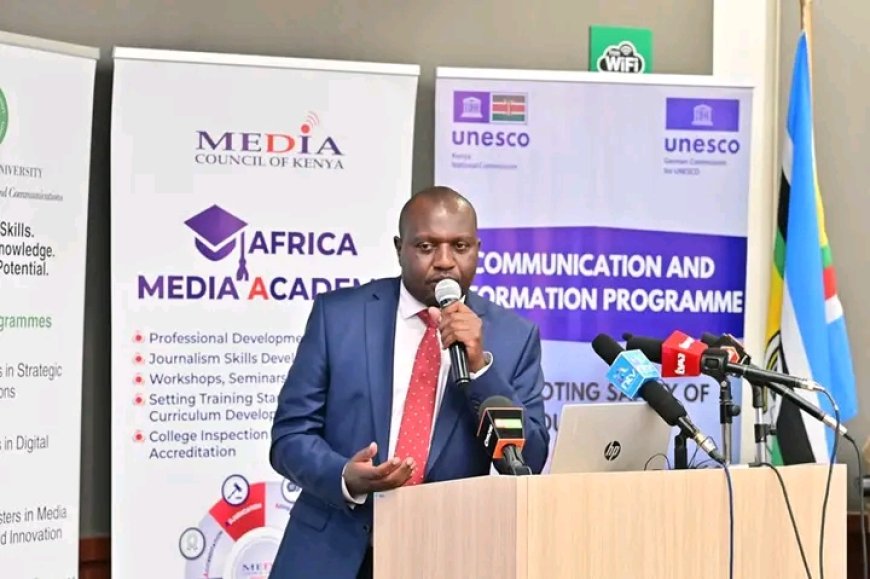Driving Climate Solutions Through Ethical Journalism

Aga Khan University, Nairobi
Friday, 14 January, 2025
McCreadie Andias
Radio, the timeless medium of communication, remains one of the most trusted sources of news, education, and entertainment across Kenya.
As the world marked this year’s World Radio Day, key media stakeholders gathered at the Aga Khan University Graduate School of Media and Communications in Nairobi to reflect on the role of radio in society.
The event, organized by the Media Council of Kenya, Aga Khan University, and the Kenya National Commission for UNESCO, saw experts in the field call for greater professionalism and solution-oriented reporting, particularly in the face of the climate crisis.
Radio is more than just sound waves transmitting information—it is a bridge between communities, a catalyst for social change, and a lifeline during times of crisis. As Prof. Edward Kisiang’ani, Principal Secretary for the State Department of Broadcasting and Telecommunications at the Ministry of Information, Communications & The Digital Economy KE, aptly put it, “Radio, in and of itself, is nothing—it’s the human connection that matters. We must celebrate the profession by producing high-quality, informative and inspiring content.”
In an era of misinformation and digital disruption, the ethical standards of radio journalism must be upheld to maintain trust and credibility. The Media Council of Kenya CEO David Omwoyo emphasized this duty, stating, “We have a duty to ensure that the information transmitted across the airwaves is accurate and informative. It is an ethical challenge to retain the sanctity of radio as a space for true and verified information.”
As Kenya grapples with the harsh realities of climate change, stakeholders stressed on the need for radio stations to shift their focus from mere disaster reporting to solution-driven journalism.
Prof. Kisiang’ani urged broadcasters to leverage their platforms to educate the public on environmental conservation. “We must use radio as a platform to educate people about the dangers of deforestation, pollution, and poor waste disposal. Journalists should go beyond reporting disasters and focus on advocating for long-term solutions.”
Echoing this sentiment, Omwoyo emphasized the need for research-driven reporting. “As the media landscape undergoes a digital revolution, research must remain at the core of journalistic work. Climate change reporting should not merely highlight disasters but should also provide actionable solutions for communities.”
Prof. Nancy Booker, Dean of the Aga Khan Graduate School of Media and Communications, reinforced the importance of proactive journalism in tackling climate change. “Every drop counts in the fight against climate change. Journalists must go beyond reporting problems and actively engage experts and communities in finding viable solutions.”
While journalists play a crucial role in disseminating information, they also have a responsibility to hold policymakers accountable. Kenya Editors Guild President Zubeidah Kananu Koome called for greater scrutiny in how climate-related funds are utilized. “Climate change is no longer an abstract concept—it is a lived reality. We must go beyond just reporting crises to holding policymakers accountable for their promises and ensuring that environmental funds are properly utilized.”
This sentiment aligns with the need for transparency and ethical governance, ensuring that climate policies are not only enacted but effectively implemented to benefit affected communities.
Despite the crucial role radio plays in informing the public, concerns remain about the treatment of journalists within the industry. Kenya Union of Journalists Secretary General Eric Oduor highlighted the need for fair labor practices in media houses. “Radio remains one of the most powerful tools for communication in Kenya. However, we must ensure that radio stations comply with professional guidelines and do not exploit journalists through poor working conditions.”
His remarks highlight the broader issue of sustainability in journalism—ensuring that those tasked with delivering the news are well-equipped, supported, and protected in their work environments.
Radio’s accessibility makes it an indispensable medium, especially in remote areas where digital access remains limited. Alfred Ambani, Deputy Director of Multimedia Services at the Communications Authority of Kenya, pointed out its enduring influence. “Radio remains a trusted source of news, education, and entertainment. Its accessibility ensures that information reaches even the most remote areas, making it a vital tool for national development.”
Indeed, in a country where many rely on radio for news and guidance, the responsibility of broadcasters to provide accurate, constructive, and solution-oriented content is more critical than ever.
As climate change continues to pose a significant challenge, Kenyan radio stations must rise to the occasion by producing high-quality, ethical, and solution-driven journalism.
The future of radio lies not just in reporting the news but in shaping narratives that drive real change. By embracing research, accountability, and ethical standards, radio journalists can ensure that their work contributes meaningfully to national development and environmental conservation.
What's Your Reaction?


































































































































































































































































































